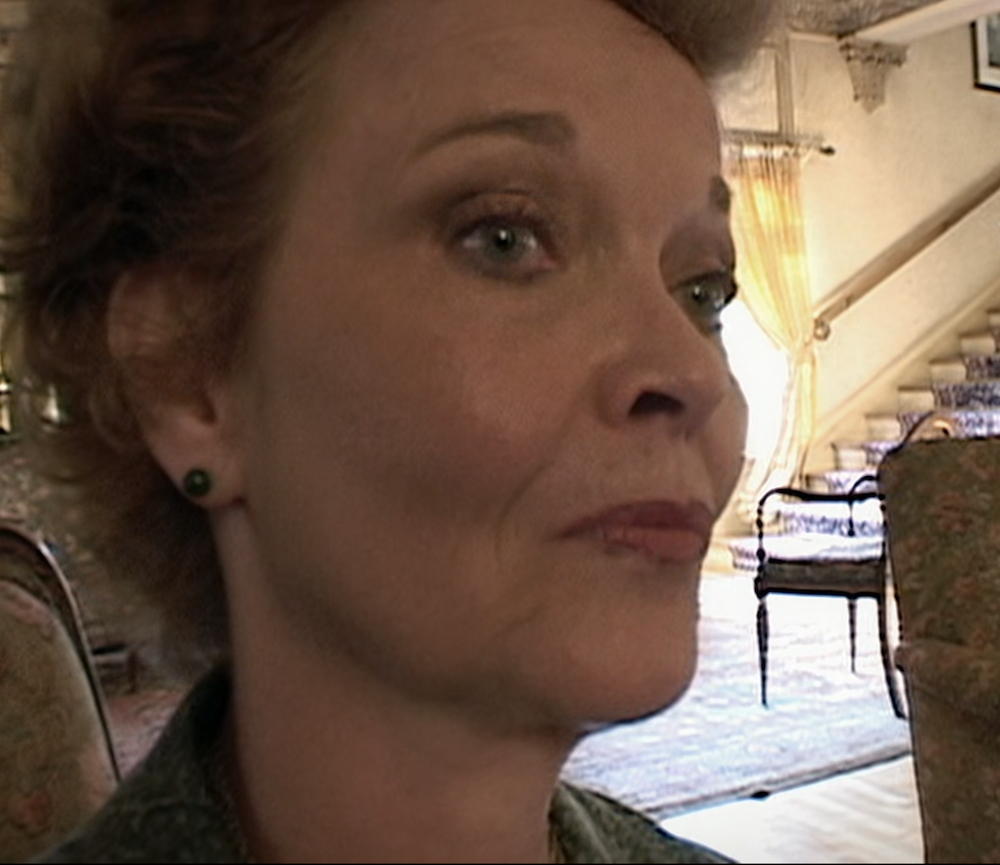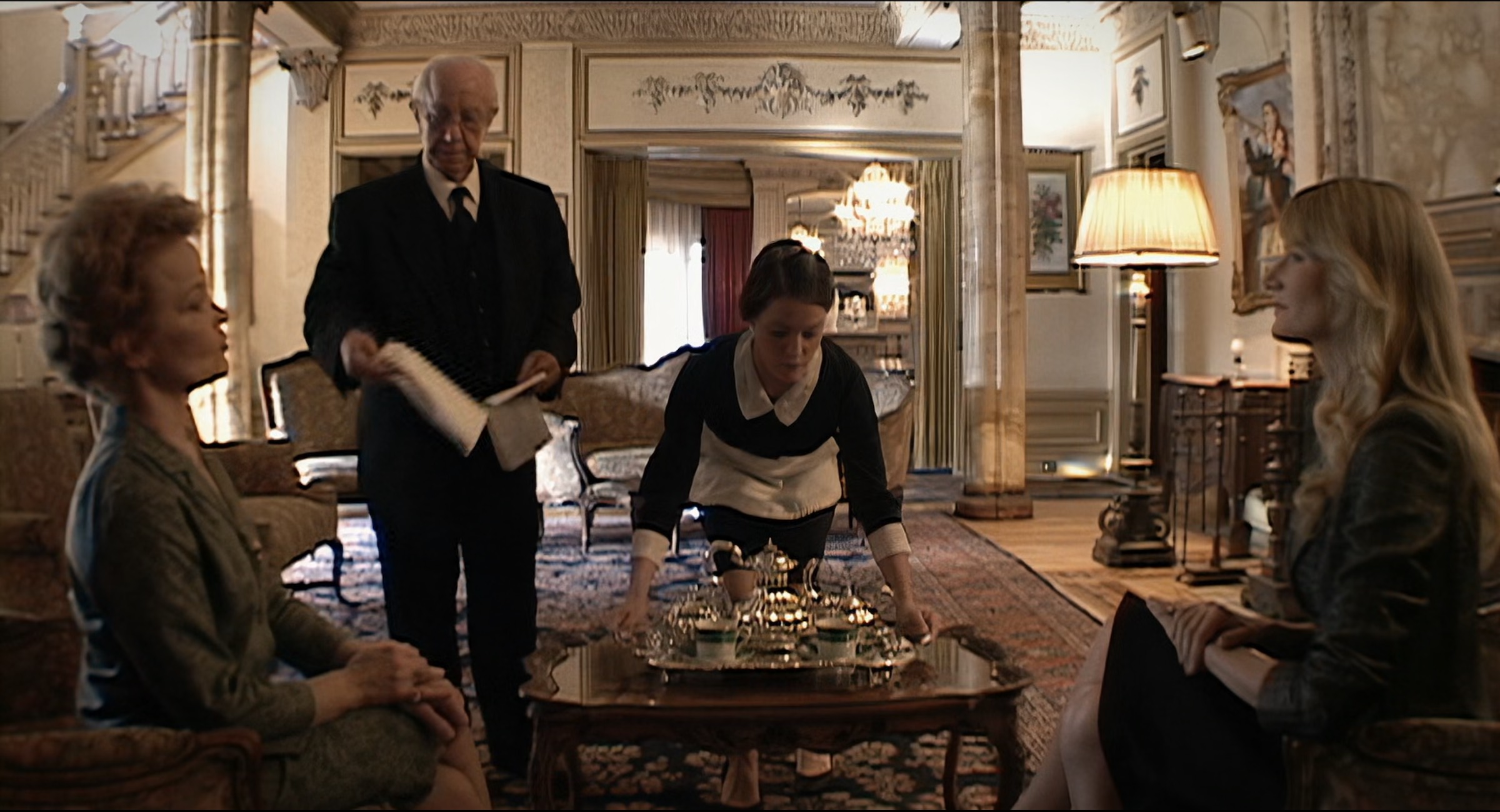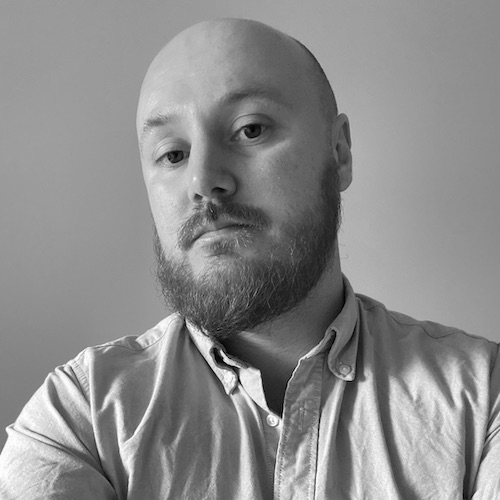Grace Zabriskie as
Visitor #1 in
Inland Empire (2006)
by Matthew Kinlin
 An opening shot in low resolution. A visitor arrives beneath a canopy of saturated, lime green trees. We see Grace Zabriskie’s puzzled face as she wanders up the garden path, her gigantic alien head ballooning out of her emerald dress like the projection of the Wizard of Oz inside his throne room. Her pneumatic forehead and bouffant hair are inflated in David Lynch’s too-close shots. Lynch swims the camera further into her hair as she buzzes the outer gate of a Hollywood villa and moves inside.
An opening shot in low resolution. A visitor arrives beneath a canopy of saturated, lime green trees. We see Grace Zabriskie’s puzzled face as she wanders up the garden path, her gigantic alien head ballooning out of her emerald dress like the projection of the Wizard of Oz inside his throne room. Her pneumatic forehead and bouffant hair are inflated in David Lynch’s too-close shots. Lynch swims the camera further into her hair as she buzzes the outer gate of a Hollywood villa and moves inside.
This is the way to the palace.
A luxurious yet cold mansion. The light coming through the windows is far too bright. Sickly yellow walls and dark furniture. Laura Dern as actress Nikki Grace moves from alcove to alcove, aware of a stranger at her door. The wide and long shots of the interior create a feeling of otherworldly distance. A voice comes from the doorway. I’m your new neighbour. Nikki later comments that it’s very rare these days for a neighbour to introduce herself. An ancient custom, somehow out of time. We see the back of Nikki’s faithful butler. A vampire needs to be invited inside. The butler turns and Nikki grants permission.
It is difficult to see it from the road.
The visitor smiles her wide grin. She makes pleasantries. Such a lovely home. Nikki replies that we enjoy it very much, referencing an unknown partner, hidden somewhere amongst the pillared columns. A coffee would be lovely, the visitor accepts. They sit and enact a form of etiquette that settles Nikki for a few moments. Oh, yes. Very good, her visitor smirks. The high cheekbones of Zabriskie, her beautiful but pursed lips corrupt a sense of old Hollywood glamour. She becomes a conduit for the hysterical blindness of a sibyl, her wide gaze falling upon the opulent façade of Nikki’s life. In the background, we hear an endless drone: a horizontal sense of menace starting to take grip. Nikki’s visitor is a phantom, a trickster and a shape-shifter. The Slavic god Veles can teleport between this world and the next. When Nikki asks the neighbour where she lives, she replies, Just down the way. Tucked back in the small woods. The brick house. It is difficult to see it from the road. A Gogol crone tottered out of her fairy tale hovel to offer a terrible premonition. Lynch’s camera sits right between them, his fisheye lens switching between the convex reflection of both characters: Nikki’s confused expression and the phantasm sitting before her. Like witnessing a distorted image of oneself in a polished spoon, Nikki is dragged into the orbit of an unfortunate wish. Inside Lynch’s Carroll-esque looking glass, Alice confronts the mad Queen’s swollen head.
You have a new role to play, I hear?
As with his previous film, Mulholland Drive, Lynch offers us the underbelly of our glittering and impossible dreams. Nikki has all her hopes pinned on playing Susan in a film called On High in Blue Tomorrows. The title brings to mind Judy Garland singing on a sepia farm as The Wizard of Oz’s Dorothy Gale: Somewhere over the rainbow, skies are blue. And the dreams that you dare to dream, really do come true. Lynch’s obsession with Oz shows up in Twin Peaks in the names Major Garland, and Judy, a malevolent force created by an atomic bomb. Nikki’s visitor is both the hurricane and the rainbow; she extends a hand into a new world. A witch rising in green fire. What lies behind this sparkling, blue tomorrow? We watch rabbits perform suburban, bourgeois lives. Nikki sees herself running through Los Angeles, stabbed in the torso with a screwdriver. A homeless woman tells Nikki/Susan about a sex worker who has a hole torn from her vaginal wall into her intestine. Hollywood & Vine as a nightmare crossroads, a haunted junction of blurred traffic lights and vacant dreams. Throughout Inland Empire, we are shown Nikki/Susan with groups of beautiful but exploited women; the casting couch as a site of transhistorical abuse and violence, an evil obscured by the seductive dream of fame, women enslaved to the mechanisms of male power.

Is it about marriage?
The unnamed visitor brings a warning of the film-within-the-film. In On High in Blue Tomorrows, Nikki as Susan looks longingly into her co-star Billy’s eyes, lost in the languid heat of their fictional Southern gazebo, as well as their extramarital attraction blooming around them like forbidden magnolia. Zabriskie as the visitor asks further questions with her quizzical, often mocking, expression, like a bug-eyed Puck descended from space. Lost in a midsummer dream, Lysander awakens to see the handsome face of Helena. The way Zabriskie pronounces marriage as “mare-ee-age” fractures the relationship into an alien contract of betrayal. The actress and Nikki/Susan’s character dissolve inside Lynch’s blue adultery scenes, her maniacal husband waiting at the door. Zabriskie’s Visitor sees all of this in the long empty hallway of the house. She sips her coffee. She laughs. She is so forgetful. What was she saying?
I suppose if it was 9:45... I'd think it was after midnight!
A linear sense of temporality has been broken: the golden circle of time, a ticking clock hung from the waist of a white rabbit. It is the moment when the visitor must deliver its message, a fable-poem snatched from the forest, an old Polish tale.
A little boy went out to play. When he opened his door, he saw the world. As he passed through the doorway, he caused a reflection. Evil was born. Evil was born and followed the boy.
Nikki is caught under the visitor’s spell, the bright and uncomfortable glare of the silverware laid out before them by the silent maid. Jacques Lacan describes the moment (stade du miroir) when a child first recognises itself in a mirror and understands itself, on a pre-verbal level, as a separate being from the mother. Lacan understood this stage to be fundamentally narcissistic and based on a misrecognition or méconnaissance, of an ideal ego, constructed from fantasy images of oneself. Nikki stares into a bright light and sees a group of young women doing a choreographed dance. Come on baby, do the loco-motion... However, this méconnaissance of an ideal ego is an error; the child mistakenly believes the image in the mirror is the I: an illusory ego of wholeness and mastery. Nikki drowns in her own reflection in her dressing room mirror as the southern belle Susan, lost in clouds of perfume, like a child falling in love with a beautiful delusion. The Imaginary is unsustainable because it is based on the denial of a fragmented and chaotic body. Throughout Inland Empire, Lynch shows us dark figures leaving and entering rooms, silhouettes caught inside doorways. The child, making its way to the entrance of language, a golden Symbolic palace, is plagued with Melanie Klein’s horrific phantasy of the “body-in-pieces”: the feeling that something deep inside us wants to pull ourselves apart through dismemberment. Narcissus, infatuated with an illusion of himself, tries to bind the mutilated pieces of his own body inside a dazzling sarcophagus. Lynch’s film is infamous for the close-ups of Dern’s gigantic mouth—the phantasmic entrance for the child into splintering language, Alice tottering through a hallway of broken glass. Nikki’s dreams will soon come true. Tomorrow she will sit on the opposite side of the room and be offered the role of a lifetime. A chance to speak. As Isabelle Adjani expresses in Andrzej Żuławski’s Possession: “I’m the maker of my own evil.” The stars have formed a syzygy above the cold mansion.

An old tale, and a variation. A little girl went out to play. Lost in the marketplace, as if half-born. Then, not through the marketplace - you see that, don't you? - but through the alley behind the marketplace. This is the way to the palace. But it isn't something you remember.
Memory has faded beneath the green, digital trees. Half-born, a hybrid creature. Trapped between worlds, a man transforms into the shadow of a rabbit. Portals connect modern California with an older European world, Zabriskie’s Visitor its gatekeeper. Nikki discovers an alleyway behind a film studio with the words Axxon N. graffitied on the wall. Not through the marketplace... but through the alley behind the marketplace. It leads to a snowy street in Poland where young prostitutes work. To Hollywood Boulevard, where beautiful Bulgarian women strut across five-pointed brass and terrazzo stars of Oscar winners. They have been trafficked here, sold into slavery, prostitution and sexual exploitation. We witness Nikki navigate her own forms of subjugation, from her controlling marriage to her role as an actress, where she is compensated but again used in the service of men and their enrichment. We watch her crawl through a kaleidoscopic spectrum from complete glamour to total abjection. Alone, staggering through a nocturnal Los Angeles, Nikki asks in a disturbing and mocking tone, “I'm a whore. Where am I? I'm afraid,” surrounded by women that laugh then suddenly disappear. Her struggle reduced to nothing but mimicry, a caricature of lost and abandoned girls as a horror film soundbite.
For instance, if today was tomorrow, you wouldn’t even remember that you owed on an unpaid bill.
We are unsure what bill remains unpaid for Nikki but recognise Visitor #1 as a debtor come to collect. The power of Zabriskie’s Visitor comes from the ambiguity of her intention. Is Nikki/Susan an unfortunate victim of a Slavic curse? Has Zabriskie’s Visitor granted her a violent and hallucinatory exit from the coercive control of her marriage? Is Nikki/Susan being punished for her ambitions and subject to the trauma of other dreamers? Like Lynch’s version of Sunset Boulevard’s Norma Desmond, we later see Nikki/Susan exhausted and defeated, sat in her dressing gown and slippers. Behind her, a wall of women dance in strobing, white light. “Damn! This sounds like a dialogue from our script,” she exclaims at one point, blurring the line between the film and her own life. The only clue that Lynch has given in interviews about Inland Empire is a quote from the Hindu scripture Brihadaranyaka Upanishad: “We are like the spider. We weave our life and then move along in it. We are like the dreamer who dreams and then lives in the dream. This is true for the entire universe.” Harry Dean Stanton, as the assistant Freddie Howard, states at one point: “Well... There is a vast network, right? An ocean of possibilities.” Nikki as a beautiful prisoner in her videoed castle, looks into the eyes of Zabriskie’s pale psychopomp as the crone points a finger to the opposite side of the room. Both heads turn and we turn with them. Across the polished surface of a silver tray, a door opens into another world.
Is there a murder in your film?
As a psychic entity, the visitor already knows Nikki has the role, and the violence to come. She can smell blood on the expensive Fendi Casa couch. Infidelity being gossiped about on a vampiric chat show hosted by a Vaseline-faced Diane Ladd, Dern’s real-life mother. Our internal organs are coming apart. A shirt ruptures into red ketchup blood. Nikki paints lipstick onto her open mouth as destiny fractures into a shining web. Zabriskie’s mesmeric performance as Visitor #1, in one scene that lasts ten minutes, sends a shiver through the whole film. Her fable-poem guides us into a petrified wonderland. Dust floats across the living room, the immaculate theatre of Nikki’s marriage. An eyeball looks through a cigarette burn inside a curtain, pink portal into a labyrinthine warren. The visitor holds up a mirror to Nikki’s face as the reflection slowly begins to shatter. Lynch’s hand drifts through an endless room. Shadows splinter on the obsidian wall of a soundstage. Evil is born.
 Matthew Kinlin’s published works include Teenage Hallucination (Orbis Tertius Press), Curse Red, Curse Blue, Curse Green (Sweat Drenched Press), The Glass Abattoir (D.F.L. Lit) and Songs of Xanthina (Broken Sleep Books). As a child, he played the role of the Scarecrow in his school’s production of The Wizard of Oz. His partner’s great-granduncle was David Thursby, an actor with over one hundred, often uncredited, small roles in films including: Mutiny on the Bount (1935), William Wyler’s The Heiress (1949), The Virgin Queen (1955) starring Bette Davis, and an episode of The Twilight Zone (1960).
Matthew Kinlin’s published works include Teenage Hallucination (Orbis Tertius Press), Curse Red, Curse Blue, Curse Green (Sweat Drenched Press), The Glass Abattoir (D.F.L. Lit) and Songs of Xanthina (Broken Sleep Books). As a child, he played the role of the Scarecrow in his school’s production of The Wizard of Oz. His partner’s great-granduncle was David Thursby, an actor with over one hundred, often uncredited, small roles in films including: Mutiny on the Bount (1935), William Wyler’s The Heiress (1949), The Virgin Queen (1955) starring Bette Davis, and an episode of The Twilight Zone (1960).
~